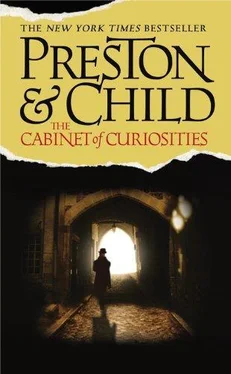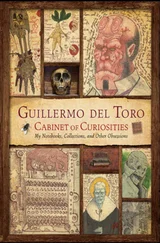Douglas Preston - The Cabinet of Curiosities
Здесь есть возможность читать онлайн «Douglas Preston - The Cabinet of Curiosities» весь текст электронной книги совершенно бесплатно (целиком полную версию без сокращений). В некоторых случаях можно слушать аудио, скачать через торрент в формате fb2 и присутствует краткое содержание. Жанр: Триллер, на английском языке. Описание произведения, (предисловие) а так же отзывы посетителей доступны на портале библиотеки ЛибКат.
- Название:The Cabinet of Curiosities
- Автор:
- Жанр:
- Год:неизвестен
- ISBN:нет данных
- Рейтинг книги:3 / 5. Голосов: 1
-
Избранное:Добавить в избранное
- Отзывы:
-
Ваша оценка:
- 60
- 1
- 2
- 3
- 4
- 5
The Cabinet of Curiosities: краткое содержание, описание и аннотация
Предлагаем к чтению аннотацию, описание, краткое содержание или предисловие (зависит от того, что написал сам автор книги «The Cabinet of Curiosities»). Если вы не нашли необходимую информацию о книге — напишите в комментариях, мы постараемся отыскать её.
The Cabinet of Curiosities — читать онлайн бесплатно полную книгу (весь текст) целиком
Ниже представлен текст книги, разбитый по страницам. Система сохранения места последней прочитанной страницы, позволяет с удобством читать онлайн бесплатно книгу «The Cabinet of Curiosities», без необходимости каждый раз заново искать на чём Вы остановились. Поставьте закладку, и сможете в любой момент перейти на страницу, на которой закончили чтение.
Интервал:
Закладка:
The silence that followed Pendergast’s statement was profound.
Without a word, Wellesley bent down over the dress, fingered it, turned up its lining, gently stretched the material in several directions. Reaching into a drawer of her desk, she pulled out a large magnifying glass and began examining the stitching and fabric. Several minutes passed. Then she sighed and sat down in her chair.
“This is a typical workhouse garment,” she said. “Standard issue in the latter part of the nineteenth century. Cheap woolen fabric for the exterior, scratchy and coarse but actually quite warm, lined with undyed cotton. You can see from the pattern cuts and stitching that it was probably made by the girl herself, using fabric issued to her by the workhouse. The fabrics came in several basic colors — green, blue, gray, and black.”
“Any idea which workhouse?”
“Impossible to say. Nineteenth-century Manhattan had quite a few of them. They were called ‘houses of industry.’ They took in abandoned children, orphans, and runaways. Harsh, cruel places, run by the so-called religious.”
“Can you give me a more precise date on the dress?”
“Not with any accuracy. It seems to be a rather pathetic imitation of a style popular in the early eighteen eighties, called a Maude Makin. Workhouse girls usually tried to copy dresses they liked out of popular magazines and penny press advertisements.” Dr. Wellesley sighed, shrugged. “That’s it, I’m afraid.”
“If anything else comes to mind, I can be contacted through Sergeant O’Shaughnessy here.”
Dr. Wellesley glanced up at O’Shaughnessy’s name tag, then nodded.
“Thank you for your time.” The FBI agent began rolling up the dress. “That was a lovely exhibition you curated last year, by the way.”
Dr. Wellesley nodded again.
“Unlike most museum exhibitions, it had wit. Take the houppelande section. I found it delightfully amusing.”
Concealed in its wrapper, the dress lost its power to horrify. The feeling of gloom that had settled over the office began to lift. O’Shaughnessy found himself echoing Custer: what was an FBI agent doing messing around with a case 120 years old?
“Thank you for noticing what none of the critics did,” the woman replied. “Yes, I meant it to be fun. When you finally understand it, human dress — beyond what is necessary for warmth and modesty — can be marvelously absurd.”
Pendergast stood. “Dr. Wellesley, your expertise has been most valuable.”
Dr. Wellesley rose as well. “Please call me Sophia.” O’Shaughnessy noticed her looking at Pendergast with new interest.
Pendergast bowed and smiled. Then he turned to go. The curator came around her desk to see him through the waiting room. At the outer door, Sophia Wellesley paused, blushed, and said, “I hope to see you again, Mr. Pendergast. Perhaps soon. Perhaps for dinner.”
There was a brief silence. Pendergast said nothing.
“Well,” said the curator crisply, “you know where to reach me.”
They walked back through the thronged, treasure-laden halls, past the Khmer devatars, past the reliquaries encrusted with gems, past the Greek statues and the Red Attic vases, down the great crowded steps to Fifth Avenue. O’Shaughnessy whistled an astringent little chorus of Sade’s “Smooth Operator.” If Pendergast heard, he gave no sign.
Moments later, O’Shaughnessy was sliding into the white leather cocoon of the Rolls. When the door shut with a solid, reassuring thunk, blessed silence returned. He still couldn’t figure out what to make of Pendergast — maybe the guy, for all his expensive tastes, was on the up-and-up. He sure as hell knew this: he was going to keep his eyes and ears open.
“Across the park to the New York Museum of Natural History, please,” Pendergast told the driver. As the car accelerated into traffic, the agent turned to O’Shaughnessy. “How is it that an Irish policeman came to love Italian opera?”
O’Shaughnessy gave a start. When had he mentioned opera?
“You disguise your thoughts poorly, Sergeant. While you were looking at the drawings from The Barber of Seville, I saw your right index finger unconsciously tapping the rhythm to Rosina’s aria, ‘Una voce poco fa.’ ”
O’Shaughnessy stared at Pendergast. “I bet you think you’re a real Sherlock Holmes.”
“One does not often find a policeman with a love of opera.”
“What about you? You like opera?” O’Shaughnessy threw the question back at him.
“I loathe it. Opera was the television of the nineteenth century: loud, vulgar, and garish, with plots that could only be called infantile.”
For the first time, O’Shaughnessy smiled. He shook his head. “Pendergast, all I can say is, your powers of observation aren’t nearly as formidable as you seem to think. Jesus, what a philistine.”
His smile widened as he saw a look of irritation cloud the FBI agent’s face for no more than an instant. He had finally gotten to him.
FOUR
NORA USHERED PENDERGAST and the dour-looking little policeman through the doorway of Central Archives, a little relieved she’d had no trouble finding her way this time.
Pendergast paused inside the door, inhaling deeply. “Ahhh. The smell of history. Drink it in, Sergeant.” He put out his hands, fingers extended, as if to warm them on the documents within.
Reinhart Puck advanced toward Pendergast, head wagging. He wiped his shining pate with a handkerchief, then stuffed the cloth into a pocket with awkward fingers. The sight of the FBI agent seemed to both please and alarm him. “Dr. Pendergast,” he said. “A pleasure. I don’t think we’ve met since, let’s see, the Troubles of ’95. Did you take that trip to Tasmania?”
“I did indeed, thank you for remembering. And my knowledge of Australian flora has increased proportionately.”
“And how’s the, er, your department?”
“Splendid,” said Pendergast. “Allow me to introduce Sergeant O’Shaughnessy.”
The policeman stepped out from behind Pendergast, and Puck’s face fell. “Oh, dear. There is a rule, you see. Non-Museum employees—”
“I can vouch for him,” said Pendergast, a note of finality in his voice. “He is an outstanding member of the police force of our city.”
“I see, I see,” Puck said unhappily, as he worked the locks. “Well, you’ll all have to sign in, you know.” He turned away from the door. “And this is Mr. Gibbs.”
Oscar Gibbs nodded curtly. He was small, compact, and African-American, with hairless arms and a closely shaven head. For his size, his build was so solid he seemed fashioned out of butcher-block. He was covered with dust and looked distinctly unhappy to be there.
“Mr. Gibbs has kindly set up everything for you in the Research Room,” said Puck. “We’ll go through the formalities, and then if you’ll be so good as to follow me?”
They signed the book, then advanced into the gloom, Puck lighting the way, as before, by the banks of ivory switches. After what seemed an interminable journey, they arrived at a door set into the plastered rear wall of the Archives, with a small window of glass and metal meshing. With a heavy jangle of keys, Puck laboriously unlocked it, then held it open for Nora. She stepped inside. The lights came up and she almost gasped in astonishment.
Polished oak paneling rose from a marble floor to an ornate, plastered and gilded ceiling of Rococo splendor. Massive oaken tables with claw feet dominated the center of the room, surrounded by oak chairs with red leather seats and backs. Heavy chandeliers of worked copper and crystal hung suspended above each table. Two of the tables were covered by a variety of objects, and a third had been laid out with boxes, books, and papers. A massive, bricked-up fireplace, surrounded by pink marble, stood at the far end of the room. Everything was hoary with the accumulated patina of years.
Читать дальшеИнтервал:
Закладка:
Похожие книги на «The Cabinet of Curiosities»
Представляем Вашему вниманию похожие книги на «The Cabinet of Curiosities» списком для выбора. Мы отобрали схожую по названию и смыслу литературу в надежде предоставить читателям больше вариантов отыскать новые, интересные, ещё непрочитанные произведения.
Обсуждение, отзывы о книге «The Cabinet of Curiosities» и просто собственные мнения читателей. Оставьте ваши комментарии, напишите, что Вы думаете о произведении, его смысле или главных героях. Укажите что конкретно понравилось, а что нет, и почему Вы так считаете.










